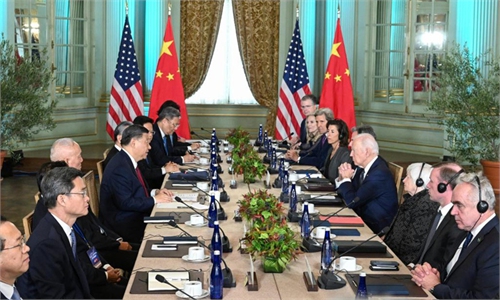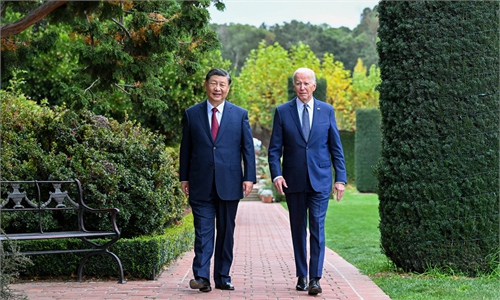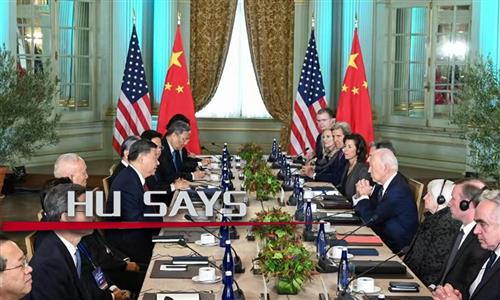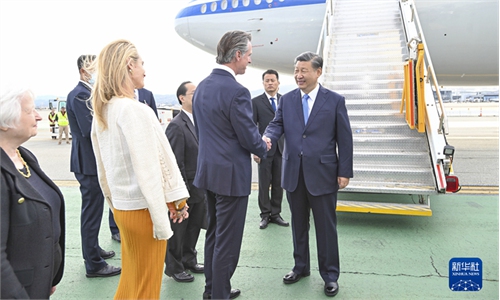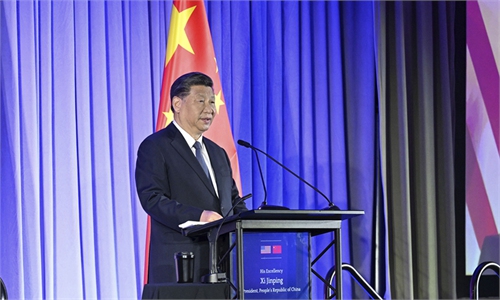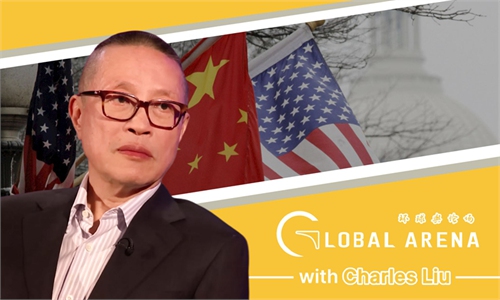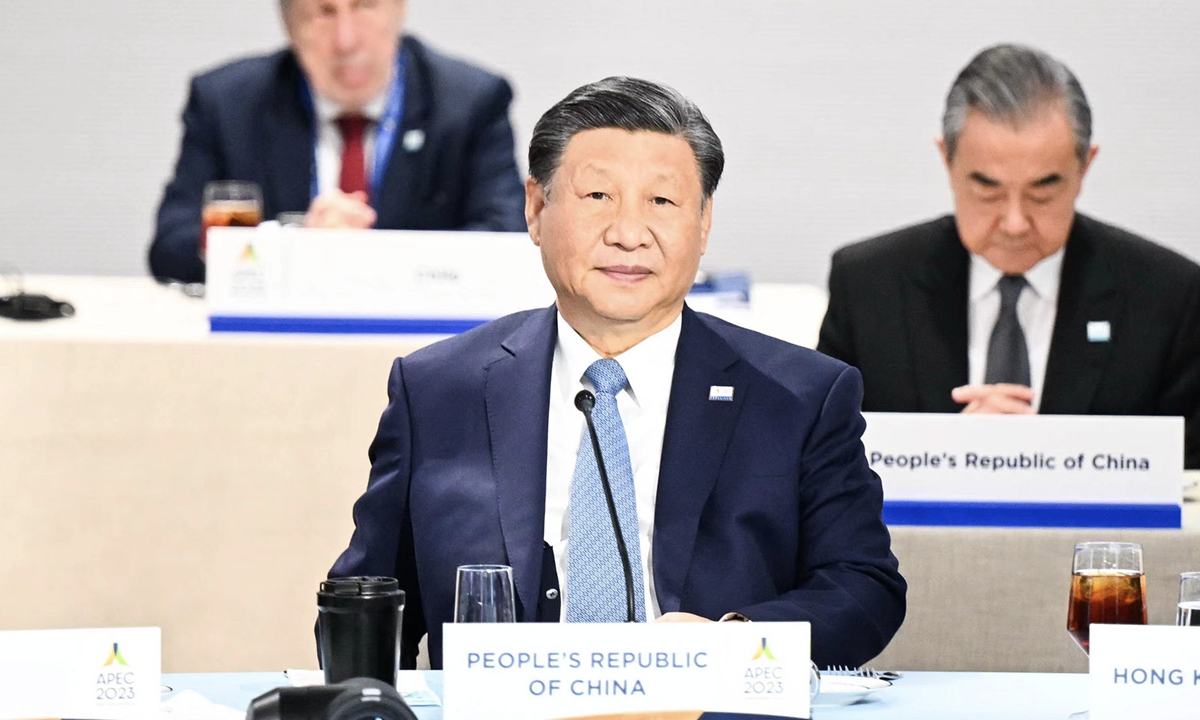
Chinese President Xi Jinping attends APEC Leaders' Informal Dialogue with Guests and working lunch in San Francisco, US, on November 16 (local time). Photo: Xinhua
Chinese President Xi Jinping on Saturday evening returned to Beijing after holding a China-US summit meeting and attending the 30th APEC Economic Leaders' Meeting in San Francisco, with expectations from experts from both China and the US that the trip will serve to further stabilize the most important bilateral ties in the world, while they also cautioned about the possible uncertainties from the US side.Chinese analysts said on Sunday that now China has pointed out the correct direction for how to develop the China-US relations, it is time to see how much the US can do and to what extent the uncertainties in Washington will impact the future. During the APEC meeting, the world has also seen China's confidence and openness to contribute to the global economic recovery, so that the world, which faces uncertainties and even turbulence in some regions, can share more benefits brought by the Chinese market with the highest certainty, experts noted.
Chinese Foreign Minister Wang Yi on Saturday briefed the media on President Xi's talks with US President Joe Biden and his attendance at the APEC meeting in San Francisco, the Xinhua News Agency reported.
Wang, also a member of the Political Bureau of the Communist Party of China (CPC) Central Committee, said that it is widely believed that President Xi's trip has attracted worldwide attention, which has added stability to China-US relations, brought new impetus to Asia-Pacific cooperation and injected positive energy into the international and regional landscape.
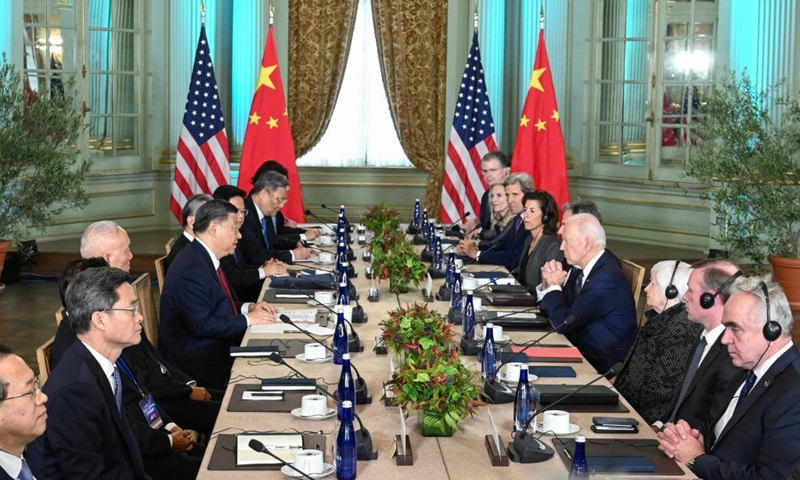
Chinese President Xi Jinping meets with U.S. President Joe Biden at Filoli Estate in the U.S. state of California, Nov. 15, 2023.(Photo: Xinhua)
Correct directionsPresident Xi pointed out in San Francisco that China and the US should assume a new vision, noting that the two countries should jointly develop a right perception, jointly manage disagreements effectively and appreciate each other's principles and red lines, jointly advance mutually beneficial cooperation, jointly shoulder responsibilities as major countries and jointly promote people-to-people exchanges, said Wang in the media briefing, adding that this has built together five pillars for China-US relations and established the "San Francisco vision" oriented toward the future.
Jin Canrong, associate dean of the School of International Studies at the Renmin University of China, told the Global Times on Sunday that there is a clear difference between the two countries which was on display at both the summit in Bali in 2022 and in San Francisco this time. "China hopes the summit can set the tone for bilateral ties from a strategic, overarching and directional perspective," he said, adding that the US has given its answer about competition and it only hopes a crisis can be managed after it breaks out.
Lü Xiang, a US studies expert and research fellow from the Chinese Academy of Social Sciences, told the Global Times that "By outlining the 'five pillars,' President Xi told the US side how to correctly develop bilateral ties, and this is the guideline that is able to not only ensure peaceful coexistence but also make win-win cooperation serve the most fundamental interests of the two peoples. But the nice vision can only be realized when the US thinks and acts in the same way."
Challenges remain
If the US provocations and military activities in regions like the Taiwan Straits and South China Sea continue, it is inevitable that tensions and crises will emerge again and again, Lü said. "China and the US still think differently, as China wants to fundamentally rule out the possibility of crisis by asking the US to change its policy of containing China, while the US cares more about how to manage the situation after a crisis breaks out as it wants to remain its containment against China," he noted.
Joseph Nye, former dean of Harvard's Kennedy School of Government, told the Global Times that "I hope the meeting will lead both countries to a more realist picture of the relationship. America cannot decouple its trade and investment completely from China without causing enormous damage to itself and the global economy."
Nye said partial "decoupling" or "de-risking" on security issues between China and the US will continue, but total economic decoupling would be prohibitively costly, adding that "There are also ecological aspects of interdependence, which make decoupling impossible. No country can tackle climate change, the pandemic threat, or other transnational problems alone."
"For better and worse, we are locked in a 'cooperative rivalry.' The situation is nothing like Cold War containment. I hope the leaders [of the two countries] will reaffirm this reality," Nye said.
Thanks to the joint efforts of both sides, more than 20 important results were achieved at the meeting, including the establishment of a working group on counternarcotics cooperation, the agreement to resume, on the basis of equality and respect, high-level communication and institutional dialogue between the two militaries, and to jointly promote the success of the 28th session of the Conference of the Parties (COP28) to the United Nations Framework Convention on Climate Change in Dubai, Wang said at the briefing to the media.
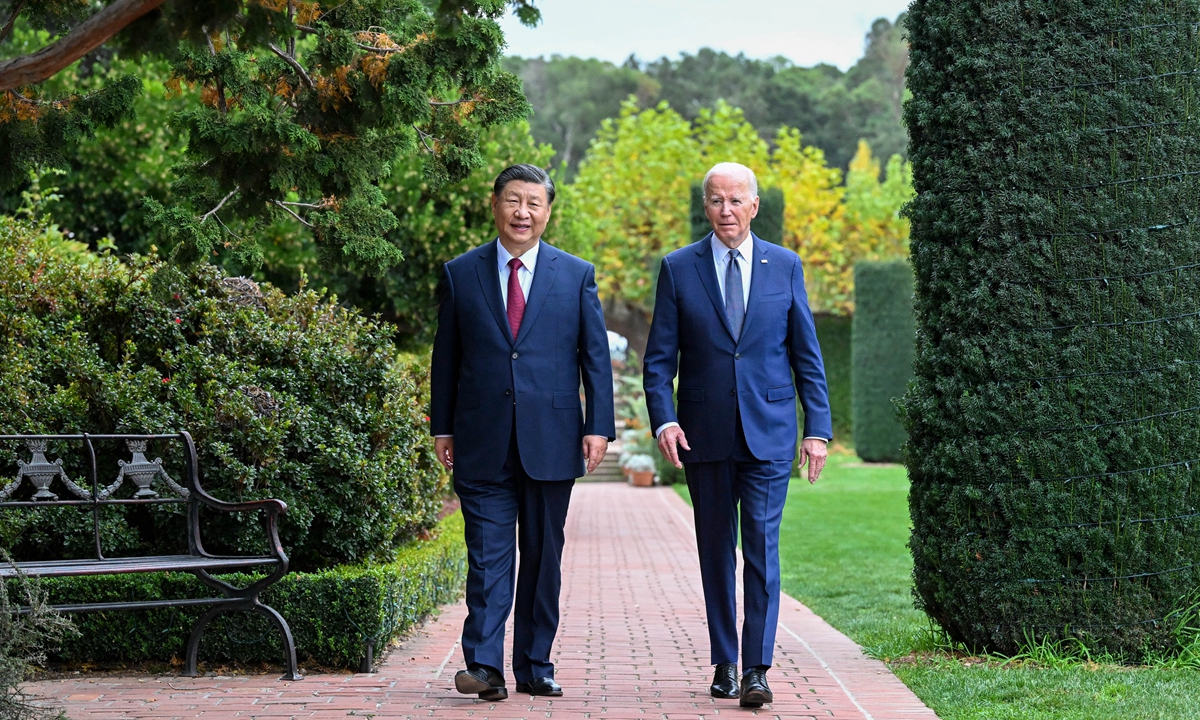
Chinese President Xi Jinping and US President Joe Biden take a walk after their talks at the Filoli estate in the US state of California on US local time November 15, 2023. Photo: Xinhua
It is clear that it was the Biden administration who desperately asked for the summit in the past few months with a series of senior officials from Washington coming to visit China, analysts said. Unsurprisingly, Republicans have criticized Biden on his "appeasement" of "the top US competitor." Some pro-Democratic US mainstream media like The New York Times have tried to balance these narratives by painting it look like it was China that asked for the US to ease tensions under economic and political pressure."It proves that groups who don't want to see China-US ties stabilizing will not disappear after the summit, and that the US mainstream media, as always, will misinterpret the significance of the summit and the necessity for both sides to manage their differences. We should never have the illusion to expect them to tell the story of China-US relations correctly," Li Haidong, a professor from the China Foreign Affairs University, told the Global Times on Sunday.
In the future, to what extent China-US relations can be stabilized depends on how the US turns its promises into actions. The US side should be responsible for solving the structural problems in bilateral ties, and a key problem is that the US has still not learned how to accept the rise of China, Jin noted.
"Although we all know that the challenges and problems remain on the US side, it's necessary for China to show its responsibility and give an answer to the world and to the history of striving to manage China-US tension. We can see from the current situation of bilateral ties some mitigation, but not yet improvement," he noted.
Hopes on the peoples
On Friday afternoon local time, before Xi left San Francisco, the city's Mayor London Breed and other US representatives saw him off at the airport. On the way to the airport, representatives of overseas Chinese and Chinese students gathered on both sides of the road. They waved the national flags of China and the US, warmly bidding farewell to Xi and congratulating him on the complete success of his visit, Xinhua reported on Saturday.
President Xi's meeting with President Biden has greatly recovered the atmosphere between the two countries. This is the foundation for the two major powers to manage their ties in an appropriate way, to rebuild mutual trust and also to seek possibilities for cooperation, Jin said.
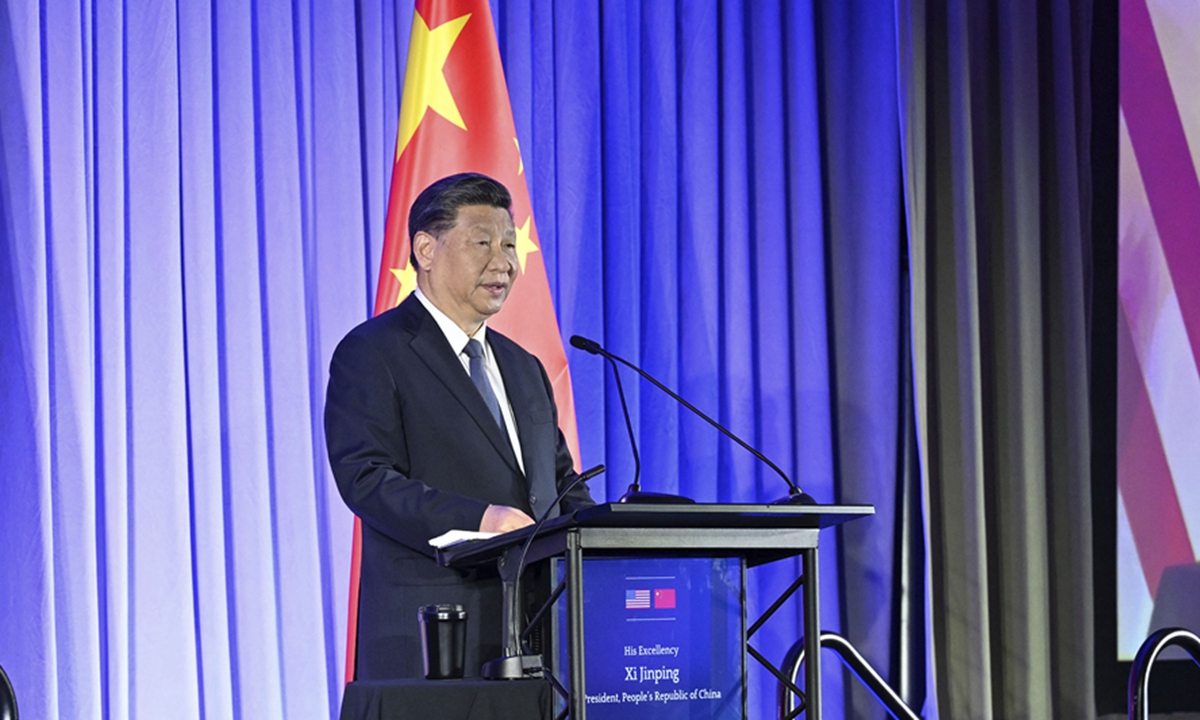
Chinese President Xi Jinping delivers a speech at a welcoming dinner hosted by friendly organizations in the US, including the US-China Business Council and the National Committee on US-China Relations, in San Francisco on local time November 15, 2023. Photo: Xinhua
During the trip, Chinese leader sent a signal that China's policy toward the US is becoming more multi-dimensional, as China is being more friendly, sincere, patient and pragmatic when dealing with American people, business and industrial circles, youth, as well as local governments and officials, like Governor of California Gavin Newsom, experts said, noting China is determined to ensure China-US relations can withstand the uncertainties caused by the impacts in the fields of geopolitics and security, experts said.During his speech on Wednesday at the welcome dinner by friendly organizations in the US in San Francisco, Xi announced that China is ready to invite 50,000 young Americans to China on exchange and study programs in the next five years, and China is ready to work with the US on panda conservation, to meet the desire of US people to see pandas there.
Xi also confidently introduced the ideas of the Communist Party of China and China-proposed initiatives to the US people and elites, to let them understand that China and the US share similar values in how to build a better world for the next generation and how to satisfy the people's demands, experts said. In the future, China will act more confidently to break the ideological barrier that blocks people-to-people exchange between the two countries.
Economic confidence
Xi made an in-depth review of the inspiration from the course of Asia-Pacific cooperation, pointing out that openness and inclusiveness are the defining feature of Asia-Pacific cooperation, development for all is the overarching goal of Asia-Pacific cooperation, and seeking common ground while shelving differences is the best practice of Asia-Pacific cooperation.
On how to build the next "golden 30 years" in Asia Pacific, President Xi called for innovation-driven, open, green development, and inclusive development that delivers benefits to all. He also called for high-quality growth to promote the building of an Asia-Pacific community with a shared future so that the fruits of modernization are widely shared.
At the APEC meeting, Xi pointed out that China's economy has been steadily recovering and turning for the better, and its growth rate is among the highest among major economies of the world, Wang told media, adding that China remains the most powerful engine of global growth.
Xi stressed that China's resolve to foster a market-oriented, law-based and world-class business environment will not change, and China's policy of providing equal and quality services to foreign investors will not change, Wang told the media. The Chinese foreign minister said that the attitude sends a strong signal of China's high-level opening-up and boosts the confidence of all parties in continuing cooperation with China.



